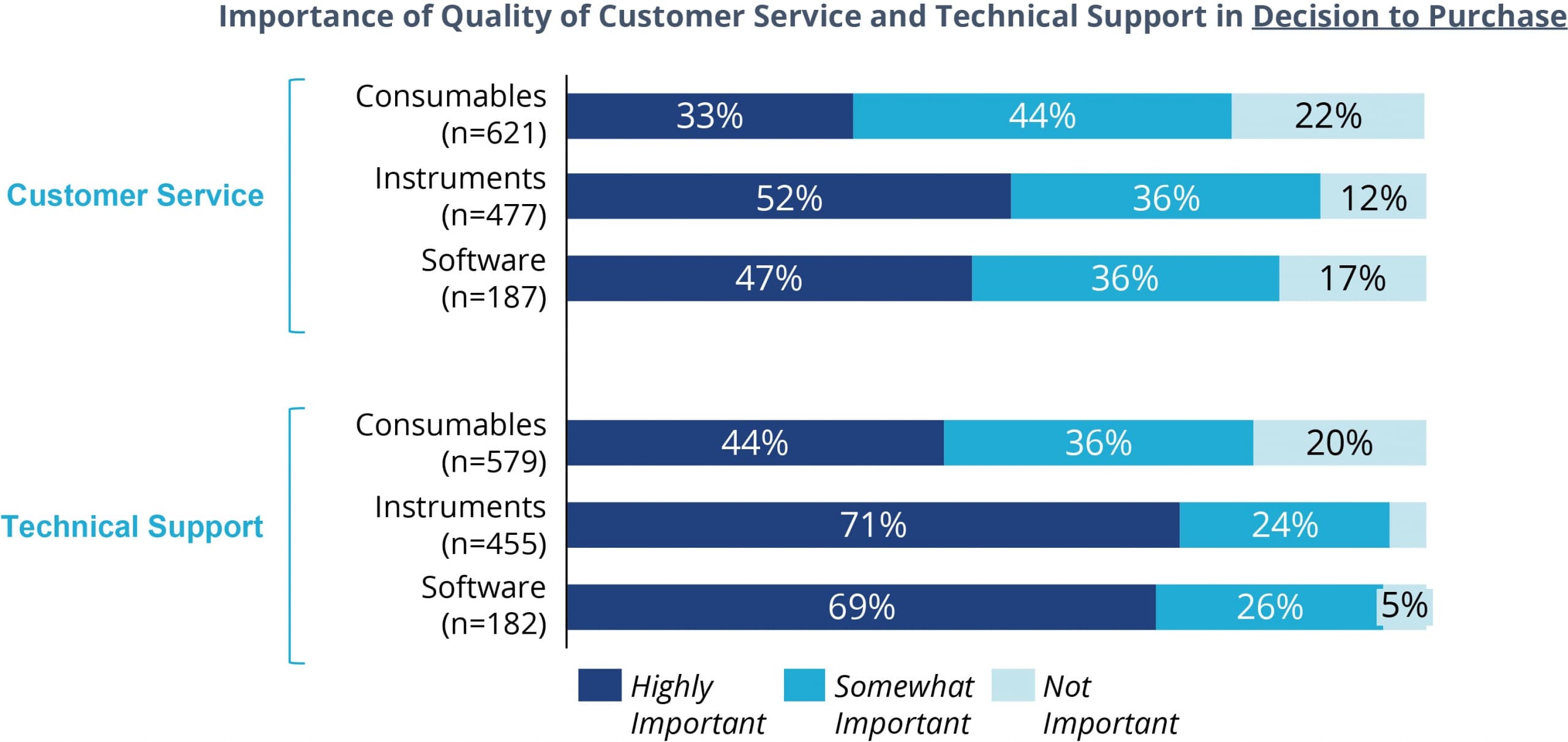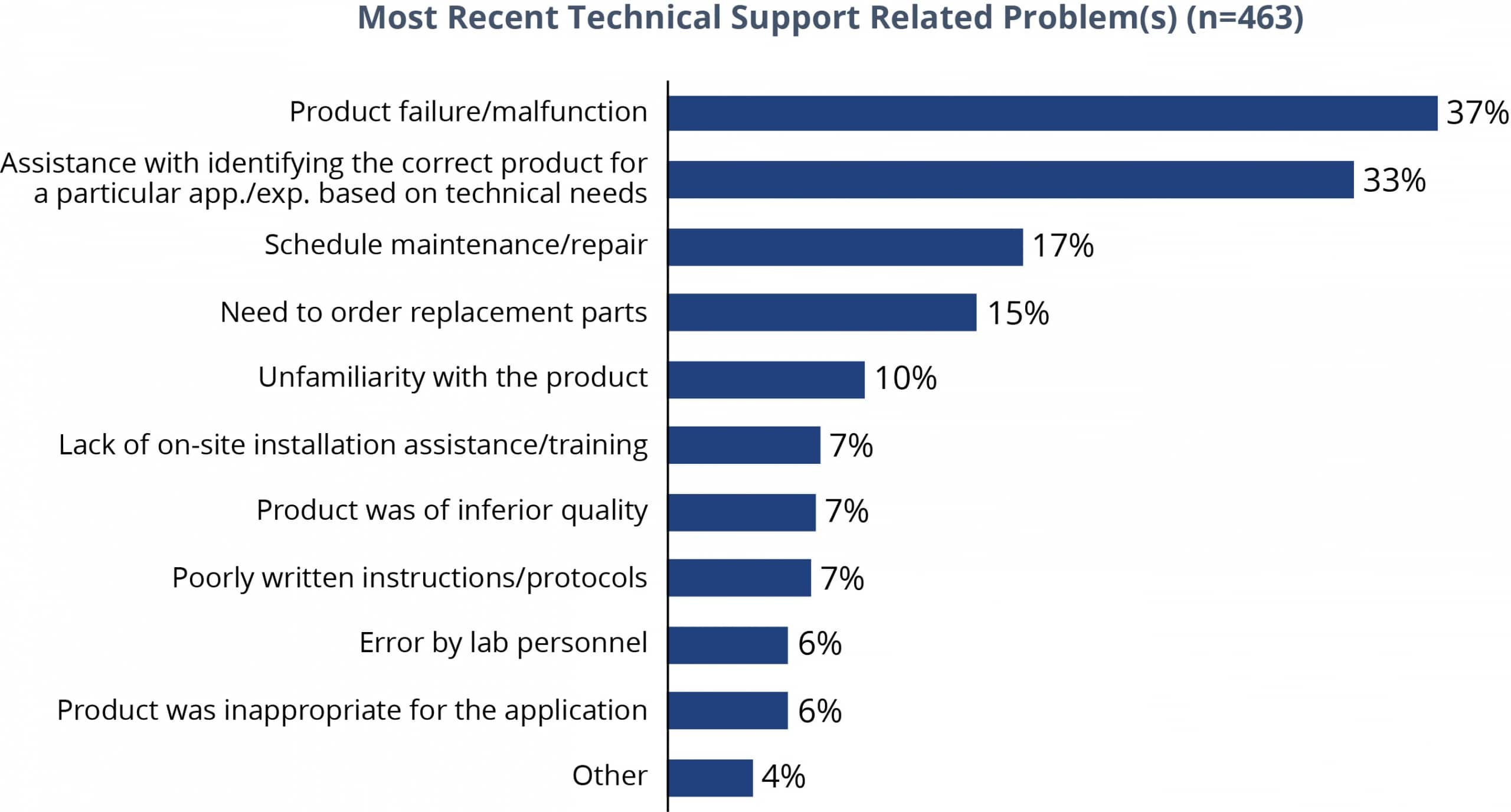Customer Service & Tech Support in the Life Science Market
The role and impact of customer service and technical support in the life science market has changed. At many companies, customer service and technical support activities traditionally lacked the glamour associated with developing innovating new technologies and products for research. Today, however, competitive forces, technological advances and heightened customer expectations have propelled service and support out of the shadows and into the forefront of management attention.
Opportunities for establishing technological differentiation have become less frequent as research products mature. Rather than compete on price, leading vendors in the life science market understand that retaining customers is a strategic imperative because customer loyalty drives market share and profitability. Providing responsive service and support is a key element in ensuring loyalty and is an important source of competitive differentiation.
The challenge is that as each company raises the bar for service and support to increase their attractiveness, they effectively raise the customers’ expectations of service and support from every company in the market. The same holds true for every company with whom a scientist interacts. In their personal and professional lives, scientists experience varying degrees of service and support that influence their expectations. Thermo Fisher is not just being compared to Bio-Rad or MilliporeSigma when a scientist purchases an instrument from Thermo Fisher, but also to the ease of ordering and speed of delivery from Amazon, the troubleshooting protocols of their cable provider, and the service warranty from their car dealership.
The consumer products market is embracing AI-driven intelligent assistants, mobile talk-to-search, direct messaging and many other techniques to improve response times, increase personalization and create self-serve tools. The end-result is that as scientists receive better treatment across the board, they soon demand even better treatment including from the companies that supply their labs. The challenge facing all life science companies is to implement innovative service and support strategies when across all industries service experiences constantly reset customer needs, expectations and the elements they value. How will life science suppliers compete?
Our latest report, Customer Service and Technical Support for Life Science Products provides benchmark data from over 700 scientific customers expect and the value they place on different aspects of service and support. New expectations of what constitutes “value” in the minds of customers are constantly evolving. It is incumbent upon life science suppliers to implement equally dynamic methods to monitor what customers’ value and align these expectations with what life science suppliers can deliver.

Importance of Customer Service & Tech Support in the Purchase Decision
Not all customers are equal, nor are their needs for service and support universal. Here customer segmentation plays a vital role. Through internal data mining and external market research to stratify customer needs and values. High value customers and prospects (however defined) are treated differently from mid-tier and lower value customers when it comes to service and support. There are some basic, common needs of course such as accurate pricing and billing. All customers expect and deserve accuracy – if invoices are consistently inaccurate, customers will defect. However, a high-value account that places thousands of orders per year warrants a level of customized service that actually reduces the burden of its own processes and costs that would not be afforded to an individual placing an order online.

Common Problems Reported to Customer Service
Similarly, on the technical support side, life science companies must satisfy the basic must-have needs of all customers, while selectively providing higher value (and higher-cost) support services to its most valuable accounts. Onsite personnel, loaner instruments, and a guarantee of minimal downtime are something that a major pharmaceutical facility will be willing to pay for on an annual basis that a smaller research campus would only wish to purchase on an as-needed basis.

Common Problems Prompting Call to Tech Support
When a customer experiences a problem, outstanding, “beyond-the-call-of-duty” service can generate corporate goodwill. But it is not possible to build loyalty solely on the basis of a talent for narrowly escaping disaster. A customer’s level of satisfaction will be derived from the sum of each and every encounter they have with a vendor. Totally satisfied customers are created when:
- Customers understand what product is a solution to their problem and is easy to buy
- Products are intuitive to use, and reduce the customer’s sense of risk and vulnerability
- Both the product and technical support are available when needed
- Service and support are accessible in a variety of ways (i.e., “multichannel”)
Life scientists define as “valuable” any product or service that elevates their performance or lowers their costs. Responsive service and support contributes to both of these objectives. Individual or laboratory performance is heightened when ordering and delivery problems are avoided, or technical issues are resolved quickly. Lowering costs does not simply refer to the price of the product, but also reflects time and convenience costs. Successful vendors establish differentiation by creating value that yields a premium price in excess of the extra cost of providing the desired elements of value. In a market where technological differentiation is becoming so difficult to achieve, providing quality service and support has become a major element of customer value.
Download the free report brochure including the Table of Contents here.





